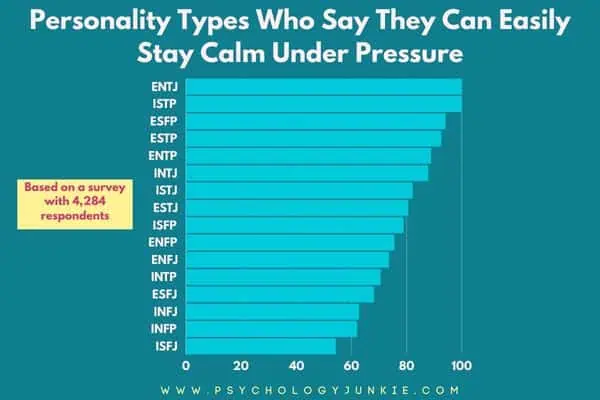Here’s How You Handle High-Pressure Situations, Based On Your Myers-Briggs® Personality Type
We’ve all been there—heart racing, palms sweaty, mind scrambling to find a solution as the clock ticks down. Whether it’s a looming deadline at work, an unexpected crisis at home, or navigating a tense conversation, pressure has a way of finding us all. The physical effects are universal, but the way we handle these high-stress moments can vary greatly from person to person.
For me, work challenges or pressure in my environment tends to make me really high-energy and proactive. I become very Type A and driven, immediately prioritizing what needs to be fixed or accomplished and getting it done. Personal and relationship crises are another story; they tend to suck all the energy out of me and leave me feeling like a deflated balloon (I’m an INTJ, by the way). Until I can find a way to “package” the crisis and store it away with some kind of a solution I feel pretty defeated. Any other types relate? You’ll have to let me know in the comments.

As an MBTI® practitioner with over a decade of experience working with thousands of individuals, I’ve found that our personality types play a significant role in how we respond to stress and pressure. Some of us need a bit more support and others take challenges by the horns, excited to be in the line of fire.
To figure out more details about this, I conducted a month-long survey asking the personality types many questions about how they deal with emotions. One of those questions was, “Do you easily stay calm under pressure?” Respondents could choose from “Yes,” “Often,” “Rarely,” or “No.” The results were fascinating and shed light on the wildly different ways each of the 16 personality types navigate stressful situations. Let’s dig into the results and see what we can discover!

Not sure what your personality type is? Take our personality questionnaire here. Or you can take the official MBTI® here.
How the 16 Myers-Briggs® Personality Types Handle Pressure: Who Stays Calm and Who Struggles?
Table of contents
- How the 16 Myers-Briggs® Personality Types Handle Pressure: Who Stays Calm and Who Struggles?
- ENTJ – The Directors
- ISTP – The Vigilantes
- ESFP – The Champions
- ESTP – The Daredevils
- ENTP – The Trailblazers
- INTJ – The Strategists
- ISTJ – The Detectives
- ESTJ – The Captains
- ISFP – The Virtuosos
- ENFP – The Visionaries
- ENFJ – The Mentors
- INTP – The Prodigies
- ESFJ – The Defenders
- INFJs – The Mystics
- INFPs – The Dreamers
- ISFJs – The Protectors
- What Are Your Thoughts?
Estimated reading time: 21 minutes
ENTJ – The Directors
Survey Result: 100% said they easily stay calm under pressure.
This result made me laugh. Of course ENTJs answered 100% with a “Yes” or “Often” for staying calm under pressure. That’s their wheelhouse after all. These types love a challenge, and if there isn’t one, that’s when they’re going to get irritable. Situations where they can take the lead, make things happen, and get results excite them. Their confidence and decisiveness allow them to look calmly at situations and implement effective solutions without breaking a sweat.
Why They Stay Calm:
- Strategic Thinking: ENTJs are all about seeing big picture and planning several steps ahead, which means they’ll have contingency plans ready for unexpected situations.
- Confidence and Decisiveness: ENTJs believe that whatever comes their way can be managed, and a quick decision is better than inaction.
- Emotional Resilience: They tend to keep emotions in check, focusing on logic and outcomes rather than getting overwhelmed by feelings.
Famous Example: Think of Tommy Shelby from Peaky Blinders. His cool, collected demeanor and ability to make swift, strategic decisions under intense pressure are what make the Shelby family so formidable and tough to cross.
Find out more about ENTJs: 10 Signs of an Unhealthy ENTJ
ISTP – The Vigilantes
Survey Result: 100% said they easily stay calm under pressure.
ISTPs are the masters of staying cool in the face of adversity. When life gets too predictable and routine, they get bored. Their practical and adaptable nature helps them to react swiftly and effectively when unexpected challenges arise. They get a thrill from troubleshooting and often see high-pressure situations as opportunities to apply their skills and ingenuity.
Why They Stay Calm:
- Hands-On Problem Solving: ISTPs are natural tinkerers who love diving into problems and figuring out practical solutions on the spot.
- Adaptability: They are content with change and can adjust their approach quickly as situations evolve.
- Composure: ISTPs rarely let emotions cloud their judgment, maintaining a steady and calm presence even in chaotic environments.
Famous Example: Han Solo from Star Wars is a classic ISTP. His quick thinking, resourcefulness, and unflappable coolness and humor under extreme pressure make him a great sci-fi example of this type under stress.
Find out more about ISTPs: The ISTP Cognitive Function Stack
ESFP – The Champions
Survey Result: 94.12% said they easily stay calm under pressure.
ESFPs are often called “The Entertainers” and a lot of people talk about how bubbly, enthusiastic, and fun they are. But there’s a lot more to them than that! They bring a surprising level of calm to stressful situations, using their energetic and optimistic nature to diffuse tension. They are quick on their feet and enjoy being in the moment, which helps them respond effectively when unexpected pressures arise.
Why They Stay Calm:
- Adaptable and Spontaneous: ESFPs can think on their feet and adapt to changes effortlessly.
- Enthusiastic Outlook: Their natural optimism helps them see challenges as temporary and manageable.
- People Skills: They have a gift for reading the room and using their charisma to ease tension and rally others.
Famous Example: Steve Harrington from Stranger Things may get a little annoyed being the “mom” of the group, but he’s also responsive, funny, engaging, and pragmatic. He’s not going to let anything hurt his friends, even if he’s got to put his own life on the line.
Discover more about ESFPs: 24 Signs That You’re an ESFP, the Champion Personality Type
ESTP – The Daredevils
Survey Result: 92.59% said they easily stay calm under pressure.
Put an ESTP under pressure and that’s where the best parts of their personality will show up. These types love an unexpected challenge that lets them think on their feet and troubleshoot on the fly. This kind of situation might make other types run for the hills, but they seriously enjoy it. They live for those moments when they’ve got to think fast to circumvent a problem. My ESTP husband has described so many crisis situations from his time in the military that would make me buckle over in panic but he actually enjoyed.
The tables can turn when the pressure applies to personal relationships. High-pressure, fiery arguments with family members or friends may feel initially intense, but they can also make ESTPs feel overwhelmed and drained in the long run. Pressure that they do enjoy has more of a concrete, practical nature. For example, being a player on the football field and only having a minute before the game is about to end, and needing to respond quickly and powerfully in order to score a point.
Why They Stay Calm:
- Love for Action: ESTPs enjoy dynamic environments and see pressure as a stimulating challenge.
- Quick Decision-Making: They process information rapidly and aren’t afraid to take risks to solve problems.
- Confidence: Their self-assured nature helps them take charge and instill confidence in others during stressful times.
Famous Example: Captain Kirk from Star Trek is a perfect example of an ESTP who remains cool and cunning under pressure, always ready with a quick plan or daring move to escape tight spots.
ENTP – The Trailblazers
Survey Result: 88.89% said they easily stay calm under pressure.
ENTPs like thinking their way out of chaos, and this certainly applies to their ability to handle pressure. The challenge of having to innovate to find an unusual approach in a short amount of time can actually excite them! They love intellectual challenges and see high-stakes situations as opportunities to brainstorm unusual solutions. Their inventive minds and confidence in their abilities help them stay composed and effective under duress.
Why They Stay Calm:
- Innovative Thinking: ENTPs excel at thinking outside the box and generating creative solutions on the fly.
- Confidence in Debate: They’re comfortable with conflict and see it as a pathway to improvement and discovery.
- Flexibility: Their open-mindedness allows them to adapt strategies quickly as new information emerges.
Famous Example: Tony Stark (Iron Man) from the Marvel Cinematic Universe showcases the ENTP’s flair for innovation and calm under pressure, often inventing ingenious solutions in the most dire circumstances.
INTJ – The Strategists
Survey Result: 87.90% said they easily stay calm under pressure.
INTJs love a well laid-out plan so unexpected pressure can be frustrating for them. But they also appreciate a challenge, and can perform well in high-pressure careers where a lot of strategy and leadership is needed. These types are always planning several steps ahead. When faced with pressure, they formulate a plan, then delegate, organize, and mobilize people and resources to overcome it.
High-pressure situations that tend to be the most frustrating to INTJs are ones where they have to manage a lot of nitty-gritty details or respond to multiple needs at the same time. They are more comfortable dealing with concepts, metrics, and patterns, whereas an abundance of details (answering a lot of phone calls, sorting through a lot of paperwork, or managing several people talking at once) can make them overwhelmed.
INTJ Strengths During Stress:
- Strategic Planning: INTJs often anticipate potential problems and have plans in place to address them.
- Logical Analysis: They approach stress methodically, breaking down problems into manageable parts.
- Detachment: INTJs can separate emotions from the situation, allowing them to focus on solutions without distraction.
Famous Example: Ender Wiggin from Ender’s Game exemplifies the INTJ’s composed and strategic nature, seeing the big picture and going into battle with an extreme level of focus, knowing how to lead in ever-changing, high-stakes situations.
Discover more about INTJs: 12 Amazing Fictional INTJ Characters
ISTJ – The Detectives
Survey Result: 82.18% said they easily stay calm under pressure.
ISTJs are grounded and pragmatic, and when stressful situations arise they are all about establishing the facts, formulating a plan, and staying cool-headed and calm. Their methodical and organized approach helps them maintain order and stability when things get hectic. One of their greatest skills is recalling past experience and established solutions and procedures to guide them when fixing current problems.
Situations that overwhelm ISTJs tend to be situations where they are working with a lot of unexpected chaos. Having to innovate on the fly without any past experience or guidebook to rely on can be frustrating and panic-inducing. ISTJs tend to be steady and calm, focusing on facts and proven solutions. But situations where there is no guidebook or past precedent can make them freeze up or get stuck in analysis paralysis. They need space and time to focus and if a solution is needed urgently it can make the whole situation feel out of control.
ISTJ Strengths Under Stress:
- Preparation: ISTJs often have detailed plans and protocols to follow, reducing uncertainty during crises.
- Reliance on Experience: They draw on past experiences to inform their decisions, providing a steady hand in new challenges.
- Practicality: ISTJs focus on practical solutions and step-by-step processes to resolve issues efficiently.
Famous Example: Eddard Stark in Game of Thrones embodies the ISTJ’s steadfastness and commitment to duty, staying resolute and composed even in the face of overwhelming odds.
Find out more about ISTJs: Understanding ISTJ Sensing
ESTJ – The Captains
Survey Result: 80.66% said they easily stay calm under pressure.
ESTJs are natural organizers and leaders who know how to take charge during stressful times. Their eye for details and their ability to spot flaws and inefficiencies helps them troubleshoot, delegate, and focus on the facts at hand. They have a talent for coordinating people and resources to address problems swiftly and effectively. Their confidence and decisiveness help maintain order and direction when pressure mounts.
Where ESTJs struggle is in the interpersonal realm. Dealing with conflict, emotional issues, or relationships can feel more overwhelming. That’s because emotions and relationships aren’t easily solved with facts and logistical solutions. They require the ESTJ to get into their feeling side, something that they feel more uncertain around. Many ESTJs find dealing with others’ emotions to be like walking in a minefield with no idea how to navigate it. In their efforts to help, they may inadvertently say the wrong thing, causing an explosion they didn’t anticipate.
ESTJ Strengths Under Stress:
- Leadership Skills: ESTJs are comfortable stepping into leadership roles and directing others toward solutions.
- Efficiency: They prioritize effective, timely action and are skilled at streamlining processes under pressure.
- Confidence in Structure: ESTJs trust in established systems and procedures to guide them through challenging situations.
Famous Example: Nick Fury from The Marvel Universe demonstrates the ESTJ’s ability to organize and lead under pressure, tackling bureaucratic hurdles with toughness, determination, and structure.
Discover more about ESTJs: 10 Things You Should Never Say to an ESTJ
ISFP – The Virtuosos
Survey Result: 78.95% said they easily stay calm under pressure.
ISFPs have an enigmatic, calm aura and this definitely shines through under pressure. While they’d prefer to have a tranquil outer life, they also can tune out distractions during tough moments. Sensing-Perceivers have a unique ability to respond quickly in crisis situations. This is thanks in part to their brain patterns. Neuroscience expert Dario Nardi explains that Sensing-Perceivers have a “tennis hop” brain pattern. This means that all regions of the neocortex are low amplitude and out of synch. Just like a tennis player who is hopping from foot-to-foot waiting for the ball, the ISFP brain is active and ready for any kind of incoming, unexpected event. On top of that, their flexible and compassionate nature allows them to adapt smoothly and provide support to others when things get tough.
Situations that really overwhelm ISFPs tend to be ones where they have to troubleshoot really complex technical issues. Dealing with a computer virus, handling unexpected car trouble without help, or organizing tax forms can feel overwhelming (unless, of course, they’ve had training in these specialties).
ISFP Strengths Under Stress:
- Mindfulness: ISFPs are adept at staying present, which helps them manage stress without becoming overwhelmed.
- Adaptability: They can adjust their approach as needed, embracing change rather than resisting it.
- Environmental Awareness: ISFPs, like other Sensing-Perceivers, know how to become “one” with their environment. This means that when an unexpected crisis arises they can stay in tune with the needs of the moment, using resources in their environment to solve a problem.
Famous Example: Eleven from Stranger Things illustrates the ISFP’s calm, cool demeanor. Even when the stakes are high and her friends lives are in the balance, she knows how to focus on the needs of the moment and do what needs to be done, even if it’s frightening.
Discover more about ISFPs: ISFP vs INFP: Which Are You?
ENFP – The Visionaries
Survey Result: 75.61% said they easily stay calm under pressure.
ENFPs bring a positive and creative energy to stressful situations. A challenge is just another opportunity to brainstorm and create ingenious novel ideas! They use their enthusiasm and resourcefulness to find innovative solutions and keep morale high. Their strong people skills help them collaborate effectively and inspire others during challenging times.
High-pressure situations that overwhelm ENFPs tend to involve working with a lot of details. While they love brainstorming novel solutions, managing a lot of minutiae can feel completely overwhelming. Things like looking for a lost set of keys, troubleshooting a software problem while having to look through a huge manual, or learning how to use a complex tool can feel deeply frustrating. Having to exit the world of creative ideas and enter the world of concrete details can feel stifling, like they can’t fully breathe when they’re in the midst of it.
Why They Stay Calm:
- Optimism: ENFPs maintain a positive outlook, believing that problems can be solved with creativity and cooperation.
- Inventiveness: They enjoy brainstorming and can come up with imaginative solutions under pressure.
- People-Centered Approach: ENFPs excel at rallying and motivating others, fostering a supportive team environment.
Famous Example: Barley from Onward showcases the ENFP’s creativity and ability to stay upbeat and resourceful even in stressful or awkward situations. When all seems to be going wrong, he knows how to uplift his brother, encourage him, and make split-second decisions that can help them to see their father one last time. If you haven’t seen this movie, you absolutely should watch it if you want to see an ENFP at their best (Barley is a personal favorite character of mine).
Discover more about ENFPs: Dealing with Emotional Overwhelm as an ENFP
ENFJ – The Mentors
Survey Result: 73.68% said they easily stay calm under pressure.
ENFJs believe in taking charge under pressure and managing people. This shows up being supportive, unifying the group, and helping people to see the light during dark times. They handle pressure by focusing on the needs of those around them. Their natural leadership and empathy enable them to coordinate and support others effectively during stressful times. The high-pressure situations that make them the most frustrated tend to be ones where there’s a lot of interpersonal disagreement, conflict, and confrontation. While they know how to put on their mediator hats, they can get really overwhelmed if no one is trying to work together and discord continues in spite of their best efforts.
ENFJ Strengths in Stressful Situations:
- Empathetic Leadership: ENFJs prioritize understanding and addressing the emotional needs of others, which helps maintain group cohesion under stress.
- Organizational Skills: They can effectively plan and delegate tasks to manage crises smoothly.
- Inspirational: ENFJs motivate others through encouragement and positive reinforcement, keeping spirits high during challenges.
Famous Example: Mufasa from The Lion King embodies the ENFJ’s compassionate and guiding presence, leading with wisdom and care even when faced with danger.
You might also enjoy: The Epic Hero You’d Be, Based On Your Myers-Briggs® Personality Type
INTP – The Prodigies
Survey Result: 70.59% said they easily stay calm under pressure.
INTPs don’t usually seek out high-pressure situations, but they do know how to troubleshoot during those stressful moments. They will tune out distractions and zero in on the problem, trying to understand all the components and details so that they can figure out where to make corrections or apply leverage. They enjoy dissecting problems and exploring theoretical solutions, and they tend to be more patient with the unknown than other types. Problems that would stump and infuriate a more impatient type simply make them curious.
High-pressure situations that make INTPs feel out of their depth are usually emotional ones, where they’re dealing with relationship problems and conflicts with other people. Those problems require a lot of emotional awareness, something that INTPs tend to feel more uncertain about in themselves. During relationship conflicts, INTPs may try to tune out so that they can analyze the problem, but by doing so, partners and loved ones may see them as not being “present” and get more angry or upset.
INTP Strengths in Stressful Situations:
- Analytical Problem-Solving: INTPs break down complex issues into understandable parts, reducing overwhelm.
- Detachment: They can distance themselves emotionally from the situation, allowing for clear and unbiased analysis.
- Curiosity: INTPs see challenges as puzzles to solve, engaging their intellect and keeping stress at bay.
Famous Example: Yoda from Star Wars exemplifies the INTP’s ability to stay calm and reason under pressure rather than giving into emotions and fear.
Find out more about INTPs: A Look at the INTP Leader
ESFJ – The Defenders
Survey Result: 68.24% said they easily stay calm under pressure.
ESFJs dislike high-pressure situations, preferring to have a plan and a predictable, stable lifestyle. Sensing-Judging types crave order, routine, and comfort. But this doesn’t mean that all ESFJs fly off the handle when faced with stress or pressure. They have strong organizational and people skills and use these to manage unknowns. The first order of business will be to figure out what people need and organize them to solve the problem. Bringing people together, managing logistics, and focusing on the facts and practical matters will help them right the ship.
High-pressure situations that cause ESFJs the most stress usually involve a lot of unknowns and unpredictable elements. ESFJs like working with what they know and managing concrete details; but having to make predictions, deal with novel concepts, and act spontaneously in unexpected situations can make them feel overwhelmed and out of their element.
Strengths of the ESFJ in High-Pressure Situations:
- Community Focus: ESFJs prioritize the well-being of the group, taking proactive steps to ensure everyone’s needs are met.
- Structure and Order: They use their organizational abilities to create plans and routines that manage chaos effectively.
- Responsibility: ESFJs feel a strong sense of duty, motivating them to stay composed and reliable under pressure.
Famous Example: Natalie Berzatto “Sugar” from The Bear is one of my favorite ESFJ characters. When crisis erupts, she tries to help everyone involved, bring them together, and manage details so that life has a more orderly, harmonious flow.
Find out more about ESFJs: Understanding ESFJ Rage
INFJs – The Mystics
Survey Result: 62.85% said they easily stay calm under pressure.
INFJs are deep, thoughtful, and visionary individuals. Their primary focus in life is on understanding and improving the world around them. They are highly conscious of the intangible elements of life. Patterns, emotions, hidden meanings, and implications. Many INFJs are drawn to spirituality, psychology, or the arts, where they can use their depth of insight to bring people a more meaningful understanding of life and themselves. They are at their best when life is calm, peaceful, and there’s room to ponder situations in-depth. However, when it comes to staying calm under pressure, they can sometimes struggle.
As introverted intuitives, INFJs crave a lot of quiet time to process information. Jumping into action right away can feel jarring, and dealing with unpredictable, novel situations can overwhelm them. They might overanalyze situations or become overstimulated, which can increase their anxiety rather than alleviate it. Their secondary function, Extraverted Feeling (Fe), makes them highly attuned to the emotions of others, and in high-pressure situations, this can add another layer of stress as they try to manage not only their own feelings but those of the people around them.
INFJ Strengths in Stressful Situations:
- Deep Intuition: INFJs have an eye for likely events and may be able to prepare for and anticipate a crisis well before it actually happens
- Empathy and Understanding: Their strong sense of empathy helps them manage group dynamics under pressure, helping everyone to feel heard and supported.
- Calm Reflection: INFJs often withdraw to process information internally, which can help them stay composed and think through solutions during stressful times.
Famous Example: Remus Lupin from Harry Potter often anticipates potential dangers and acts with foresight, guiding Harry and his friends through difficult situations with a composed and thoughtful approach. His ability to stay focused on the greater good, even in the face of personal hardship, reflects the INFJ’s strength in handling high-pressure scenarios by drawing on their deep sense of purpose and their commitment to the well-being of others.
Discover more about INFJs: 10 Things INFJs Look for in a Relationship
INFPs – The Dreamers
Survey Result: 62.07% said they easily stay calm under pressure.
INFPs focus on living in alignment with what they believe is right and imagining new, world-changing possibilities. Dreamers at heart, they want to create a world that aligns with their ideals. This drives them to put their energy into specific causes that resonate with them. Many INFPs devote energy to helping the underdogs or misfits of the world, wanting to help those whose voices haven’t been heard. They are at their best when they can explore their creativity and find meaning in their experiences. However, when it comes to staying calm under pressure, they can sometimes struggle.
As introverted feelers, INFPs are highly sensitive to anything that threatens their values or sense of self. They also need time to process new information and struggle to act quickly in high-stakes situations. Troubleshooting on the fly can be challenging, and managing a lot of details tends to put them into a state of charged stress. High-pressure situations where they really shine tend to be situations that require empathy and an ability to explore creative solutions. Examples of this could be helping a friend work through stage fright when they need to be on stage in just a few minutes, writing a persuasive letter to policy-makers to enact change, or thinking up a hilarious story to help a child feel better after having a nightmare.
INFP Strengths in Stressful Situations:
- Strong Inner Values: INFPs rely on their core values to guide them through stress, helping them make decisions that align with their sense of integrity, even under pressure.
- Creative Problem-Solving: Their imaginative helps them to come up with innovative and unconventional solutions when faced with challenges.
- Resilience in Adversity: INFPs’ deep sense of purpose can give them the strength to endure and overcome difficulties, especially when they believe in the cause they’re working towards.
Famous Example:
Frodo Baggins from The Lord of the Rings is my favorite example of the INFP working under pressure (if you’ve followed this blog long, you know I bring him up a lot). Throughout his journey, Frodo is burdened by the weight of the Ring and the enormous responsibility that comes with it. While he is ultimately resilient, there are many moments where the pressure threatens to break him, revealing the INFP’s battle between inner strength and overwhelming stress.
Find out more about INFPs: 10 Things INFPs Need in a Relationship
ISFJs – The Protectors
Survey Result: 54.35% said they easily stay calm under pressure.
ISFJs are supportive, organized, detail-oriented individuals. They like having a plan, knowing what to expect, and having a tranquil lifestyle. For the most part, ISFJs organize their lives in order to avoid stress or high-pressure situations. This is why they tend to create special routines and traditions that give them a sense of continuity and flow in life. In contrast, high-pressure situations tend to overwhelm them. They like to have plenty of time to think of a solution, and situations where they need to troubleshoot on the fly feel overstimulating and exhausting. They might feel like their mind “freezes up” or they may get stuck in worst-case scenario thinking. This doesn’t mean that they blow up and lose their cool, though. ISFJs push themselves to maintain composure even when the going gets tough.
ISFJ Strengths in Stressful Situations:
- Attention to Detail: ISFJs’ meticulous nature helps them to notice the small details, which can be crucial in preventing mistakes and solving problems.
- Reliable and Steady: In high-pressure situations, ISFJs are dependable, often taking on responsibilities and making sure that tasks are completed efficiently and thoroughly.
- Strong People Skills: ISFJs are a comforting presence when others are going through a hard time, listening and empathizing even in the face of overwhelming hardship.
Famous Example: Cinderella from Disney’s Cinderella is an ISFJ who remains kind and responsible despite the immense pressure and mistreatment she faces. While she appears calm on the outside, on the inside she’s dealing with a lot of emotional pain. But this never stops her from keeping up with her responsibilities and taking care of the people (or mice) who need her.
Find out more about ISFJs: What It Means to be an ISFJ Personality Type
What Are Your Thoughts?
How easy is it for you to stay calm under pressure? Do you have any tips or tricks that have worked for you when managing stress or unexpected crises? Let us and other readers know in the comments!
Explore even more about your personality type in our eBooks, Discovering You: Unlocking the Power of Personality Type, The INFJ – Understanding the Mystic, The INTJ – Understanding the Strategist, and The INFP – Understanding the Dreamer. You can also connect with me via Facebook, Instagram, or Twitter!















This is an absolutely brilliant article; thank you for all the hard work that goes into helping us understand ourselves and others better 😉
I find the question “do you stay calm under pressure” to be hard to answer. I try to appear calm on the outside (and succeed), but inside I’m panicked or stressed. So I’m not sure whether the question is asking about calm on the surface or calm on the inside.